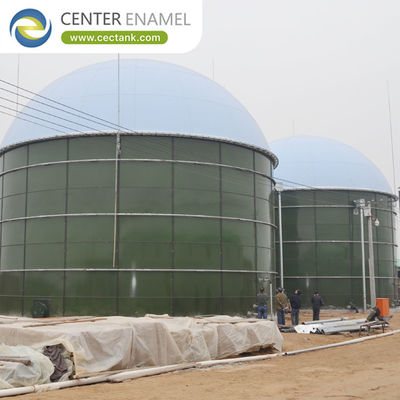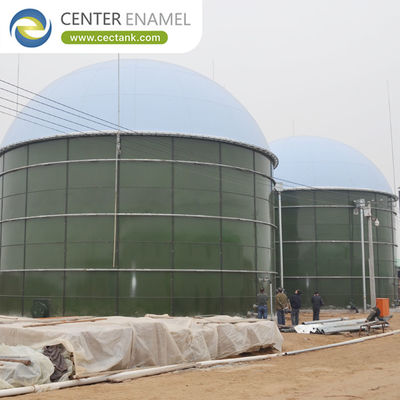-
Glass Fused To Steel Tanks (465)
-
Stainless Steel Tanks (434)
-
Fusion Bonded Epoxy Tanks (469)
-
Galvanized Steel Tanks (321)
-
Aluminum Dome Roofs (1257)
-
Wastewater Storage Tanks (226)
-
Welded Steel Tanks (457)
-
Pressure Vessels (295)
-
Anaerobic Digester (201)
-
Industrial Water Tanks (349)
-
Glass Lined Steel Tanks (180)
-
Bolted Steel Tanks (270)
-
Sludge Storage Tank (115)
-
Biogas Storage Tank (173)
-
Leachate Storage Tanks (133)
-
Agricultural Water Storage Tanks (179)
-
Fire Water Tank (166)
-
Grain Storage Silos (146)
-
Biogas Projects (381)
-
Wastewater Treatment Projects (270)
-
Double Membrane Roof (223)
Double Membrane Biogas Holder for a Food Processing Plant: Stores Biogas Generated from Treating Food Waste and Effluent
| Place of Origin: | China |
| Brand Name: | Center Enamel |
| Certification: | ISO 9001:2008 , AWWA D103 , OSHA , BSCI |
| Model Number: | Single & Double Membrane Roofs |
| Minimum Order Quantity: | 1+ |
| Price: | 0~99999 |
| Packaging Details: | Wooden Package(Customized) |
| Delivery Time: | 45days+ |
| Payment Terms: | T/T, L/C |
|
Detail Information |
|||
Product Description
Double Membrane Biogas Holder for a Food Processing Plant: Stores Biogas Generated from Treating Food Waste and Effluent
A Food Processing Plant generates significant volumes of highly organic waste, including discarded food materials, wash water, and high-strength food waste and effluent. Managing this waste sustainably and cost-effectively is essential. Anaerobic digestion (AD) is the primary method used to stabilize this organic load and, crucially, generates methane-rich biogas. For the plant to maximize energy recovery and minimize disposal costs, the biogas must be reliably and securely stored. This requires a solution that is durable, flexible, and specifically designed to handle the gas generated from treating food processing organic wastes.
The Double Membrane Biogas Holder is the optimal technology for this specialized industrial application. It stores biogas generated from treating food waste and effluent. Installed either as an integrated flexible roof on the digester or as a compact, free-standing unit , this holder provides a dynamic, hermetic reservoir. This system ensures every cubic meter of gas is captured, pressure fluctuations are safely managed, and a stable, continuous supply is maintained for downstream utilization (e.g., boilers or CHP units), turning a waste liability into a core energy asset for the food processing facility.
Product Advantages for Food Processing Biogas Management
Center Enamel’s Double Membrane Biogas Holders are meticulously engineered to handle the substantial gas output and fluctuating volumes typical of high-load food waste digestion processes, maximizing efficiency and safety.
Flexible and Dynamic Gas Reserve
The inherent variability of food processing schedules (batch production, seasonal changes) means biogas flow is rarely constant. The balloon's design provides a flexible and dynamic gas reserve capacity that can dynamically expand and contract to accommodate the natural volume fluctuations in biogas production. This dynamic buffering is essential for regulating the low pressure of the gas, preventing system instability, and ensuring a smooth, constant flow to utilization equipment. This stability is critical for continuous industrial operation, maximizing the energy offset from waste.
Reliable Energy Offset and Cost Savings
The high energy content of biogas generated from food waste allows for significant internal energy offset, which is crucial for the energy-intensive operations of a food processing plant (heating, sterilization, refrigeration). The holder ensures a stable and regulated low-pressure supply of gas to the plant's utilization equipment, reducing reliance on external, costly energy sources and significantly lowering operational costs.
Support for Aluminum Dome Roofs
Where maximum corrosion resistance and structural longevity are prioritized for the digester tanks—especially important when dealing with corrosive food waste—the Double Membrane Holder can be integrated with a tank protected by an Aluminum Dome Roof . While the membrane system provides the essential flexible gas-tight envelope, the aluminum dome offers superior long-term corrosion protection and structural support for the entire digester tank structure, enhancing overall system durability.
Company Advantages
Center Enamel’s standing as a premier global supplier is built on our deep technical expertise and commitment to quality. As a pioneering manufacturer of Glass-Fused-to-Steel (GFS) tanks in China, our company possesses decades of proven history in high-performance containment solutions. Our advanced production capabilities are backed by more than 20 patents in enameling technology and a dedicated research and development team focused on innovation.
Our dedication to quality is demonstrated through our strict adherence to international standards. Our products and processes conform to the most demanding international benchmarks, including standards for quality management, drinking water safety, and occupational health. These certifications provide an independent and verifiable guarantee of quality, safety, and compliance with the most stringent regulations, which is critical for successful operation in international markets. This commitment, combined with our proven global track record of successful projects in over 100 countries, makes us a reliable and expert partner for any food processing or waste-to-energy project.
Product Application Areas
Center Enamel's Double Membrane Biogas Holders are essential components across various sectors utilizing anaerobic digestion technology:
Food Processing Plant: Stores biogas generated from treating food waste and effluent.
Kitchen Waste Treatment: Specialized solution for collecting and buffering gas from municipal food waste.
Industrial Biogas Plants: Offers high-volume, flexible storage for efficient industrial energy production.
Breweries and Food Processing: Stores biogas generated from high-volume, organic effluent for on-site energy recovery.
Global Reach and Proven Excellence: Project Cases
Our extensive portfolio of successful containment projects showcases our capability to engineer robust, sealed, and durable solutions—expertise directly applied to our high-performance biogas holders. The following non-fictitious cases demonstrate our global reach and technical excellence:
Beijing Fengtai Food Waste Treatment Project: We provided 3 tanks for a food waste treatment facility in Beijing, highlighting our role in sustainable waste-to-energy solutions crucial for biogas production.
Guizhou Tongren Food Waste Treatment Project: We provided 2 tanks for a food waste treatment facility in Guizhou, China, showcasing our commitment to efficient organic waste management.
Muyuan Group Jiangsu Lianyungang Livestock Wastewater Project: For a major agricultural client, we supplied 7 tanks for a livestock wastewater project, demonstrating our expertise in large-volume, sealed agricultural containment critical for biogas management.
Conclusion
For a Food Processing Plant, the Double Membrane Biogas Holder is the optimal solution for managing organic waste and maximizing energy recovery. By reliably storing biogas generated from treating food waste and effluent, it ensures the safe, continuous utilization of the methane-rich fuel, significantly lowering operating costs and enhancing the plant's sustainability profile.




